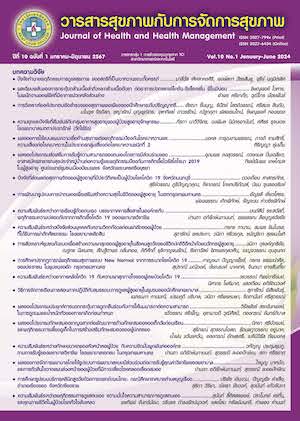The Phenomenal Study of New Normal Health Behaviors from COVID-19 Pandemic among Thai People in Congested Communities, in Bangkok
Keywords:
COVID-19 Pandemic, Health Behaviors, New Normal, Congested CommunitiesAbstract
This study was a mixed method research which aimed to study the knowledge of COVID-19, perception of self-care ability, new normal health behaviors and phenomena of health behavior from COVID-19 pandemic among Thai People in Bangkok’s congested communities. Quantitative data were collected by knowledge test and questionnaires. Participants were selected by multi-stage random sampling including 359 persons and qualitative data were gathered using in-depth interviews with 10 participants: 3 community leaders, 4 community health volunteers and 2 persons in the community. Quantitative data were analyzed using descriptive statistics and qualitative data were analyzed using content analysis. The study revealed that knowledge of COVID-19 was moderate level (Mean = 9.74, SD = 1.83) perception of self-care ability overall was moderate level (Mean = 2.62, SD = .50). New normal health behavior after COVID-19 overall was good level (Mean = 103.03, SD = 6.52) wear a face mask or cloth mask before leaving the house (Mean = 3.94, SD = .25) hand washing with soap or alcohol gel after touching things in public (Mean = 3.81, SD = .41) and the least was exercising at least 3 times/week (Mean = 2.40, SD = .93). Study of new normal health behavior phenomena from the COVID-19 pandemic among Thai People in Bangkok’s congested communities, a change in lifestyle to a new normal of life due to the COVID-19 pandemic. From the experience of performing duties of community leaders and public health volunteers during COVID-19 pandemic. Community health volunteers played important role in good management by having a major team and potential manpower and creating a system of participation in communities. There was a management process by “Demarcation of responsibility zones and good coordination”. Therefore, creating a good management system, strengthening the prevention and control of the COVID-19 pandemic in communities by having community health volunteers covering all communities in Bangkok, developing leader potential, creating network partners inside and outside the community and supporting community members. The communication is accurate, reliable, concise, and fast.
References
กระทรวงสาธารณสุข. (2567). สถานการณ์ผู้ป่วย COVID-19 ภายในประเทศ รายสัปดาห์. สืบค้นจาก https://ddc.moph.go.th/covid19-dashboard/?dashboard=main
กระทรวงสาธารณสุข. (2567). สถานการณ์ผู้ป่วย COVID-19 ตามพื้นที่รายสัปดาห์. สืบค้นจาก https://ddc.moph.go.th/covid19-dashboard/?dashboard=province
คณะเศรษฐศาสตร์ จุฬาลงกรณ์มหาวิทยาลัย. (2563). Behavior Insights ของครัวเรือนไทยภายใต้สถานการณ์ COVID-19. สืบค้นจาก https://www.tcijthai.com/news/2020/23/watch/10194
ณัฎฐวรรณ คำแสน. (2564). ความรู้ ทัศนคติ และพฤติกรรมในการป้องกันตนเองจากการติดเชื้อไวรัสโควิด 19 ของประชาชนในเขตอำเภออู่ทอง จังหวัดสุพรรณบุรี. วารสารวิทยาลัยพยาบาลพระจอมเกล้า จังหวัดเพชรบุรี, 4(1), 33-48.
นงเยาว์ เกษตร์ภิบาล, นงค์คราญ วิเศษกุล และคำพอง คำนนท์. (2565). การพัฒนารูปแบบการป้องกันและควบคุมการระบาดของโรคโควิด 19 ชุมชนเมืองแออัดในประเทศไทย: การมีส่วนร่วมของชุมชน (ระยะที่ 1). เชียงใหม่: คณะพยาบาลศาสตร์ มหาวิทยาลัยเชียงใหม่.
นักศึกษาคณะพยาบาลศาสตร์ วิทยาลัยเซนต์หลุยส์. (2562). การสำรวจข้อมูลในชุมชนเขตคลองเตย เขตบางคอแหลม และเขตยานนาวา ปีการศึกษา 2562. เอกสารอัดสำเนา. วิทยาลัยเซนต์หลุยส์.
นักศึกษาคณะพยาบาลศาสตร์ วิทยาลัยเซนต์หลุยส์. (2563). การสำรวจข้อมูลในชุมชนเขตบางคอแหลม และเขตยานนาวา ปีการศึกษา 2563. เอกสารอัดสำเนา. วิทยาลัยเซนต์หลุยส์.
ปราโมทย์ ถ่างกระโทก. (2563). เผยผลสำรวจความรอบรู้ด้านสุขภาพเพื่อป้องกัน “โควิด 19” ยังเข้าใจผิดเรื่องงดออกจากบ้าน. สืบค้นจาก https://www.hfocus.org/content/2020/04/18851
มาลี บุญศิริพันธ์. (2563). รู้จัก “New Normal” ฉบับราชบัณฑิตยสภา. สืบค้นจาก https://www.thaipbs.or.th/news/content/292126
วรยุทธ นาคอ้าย, กมลนัทธ์ ม่วงยิ้ม, และเดชา วรรณพาหุล. (2563). กระบวนการมีส่วนร่วมในการป้องกันโรคโรคโควิด 19 กรณีศึกษาผู้สูงอายุพฤฒิพลังชุมชนหนองตะโก.วารสารมนุษยศาสตร์และสังคมศาสตร์ มหาวิทยาลัยธนบุรี, 14(3), 20-30.
อรรถจักร์ สัตยานุรักษ์, บุญเลิศ วิเศษปรีชา, ประภาส ปิ่นตบแต่ง, สมชาย ปรีชาศิลปกุล, ณฐพงศ์ จิตรนิรัตน์, ธนิต โตอดิเทพย์, และธนพฤกษ์ ชามะรัตน. (2563). คนจนเมืองที่เปลี่ยนไปในสังคมเมืองที่กำลังเปลี่ยนแปลง. สืบค้นจาก https://www.isranews.org/article/isranews/download/18017/87576/18.html
อวาทิพย์ แว. (2563). COVID-19 กับการเรียนรู้สู่การปรับเปลี่ยนพฤติกรรมสุขภาพในวันนี้. วารสารสมาคมวิชาชีพสุขศึกษา, 35(1), 24-29.
อัมพร จันทวิบูลย์, พีระยุทธ สานุกูล, พัชรีวรรณ เจนสาริกรณ์, และ ณีรนุช อาภาจรัส. (2563). การศึกษาสภาพแวดล้อมและการดำเนินงานของชุมชนแออัดในกรุงเทพมหานคร ในสถานการณ์การระบาดของโรคโควิด 19. วารสารการส่งเสริมสุขภาพอนามัยและสิ่งแวดล้อม, 43(3), 91-109.
Bandura, A. (1977). Self Efficacy: Toward a Unifying Theory of Behavioral Change. Psychological Review, 84(2), 191-215.
Barakat, A. M., & Kasemy, Z. A. (2020). Preventive health behaviours during coronavirus disease 2019 pandemic based on health belief model among Egyptians. Middle East Current Psychiatry, 27(1), 43. doi:10.1186/s43045-020-00051-y
Bloom, B.S. (1971). Handbook on formative and summative evaluation of student learning. New York: McGraw–Hill.
Gao, H., Hu, R., Yin, L., Yuan, X., Tang, H., Luo, L., … Jiang, Z. (2020). Knowledge, attitudes and practices of the Chinese public with respect to coronavirus disease (COVID-19): An online cross-sectional survey. BMC Public Health, 20(1), 1816. doi:10.1186/s12889-020-09961-2
Krejcie, R.V. & Morgan, D. W. (1970). Determining Sample Size for Research Activities. Educational and Psychological Measurement, 30(3), 607-610.
Lee, M., Kang, B.-A., & You, M. (2021). Knowledge, attitudes, and practices (KAP) toward COVID-19: A cross-sectional study in South Korea. BMC Public Health, 21(1), 295. doi:10.1186/s12889-021-10285-y
Maji, C. (2021). Impact of Media-Induced Fear on the Control of COVID-19 Outbreak: A Mathematical Study. International Journal of Differential Equations, 2021(1), 2129490. doi:10.1155/2021/2129490
Melki, J., Tamim, H., Hadid, D., Farhat, S., Makki, M., Ghandour, L., & Hitti, E. (2022). Media exposure and health behavior during pandemics: The mediating effect of perceived knowledge and fear on compliance with COVID-19 prevention measures. Health communication, 37(5), 586-596.
Niessen, C., Swarowsky, C., & Leiz, M. (2010). Age and adaptation to changes in the workplace. Journal of Managerial Psychology, 25(4), 356-383.
Nwagbara, U. I., Osual, E. C., Chireshe, R., Bolarinwa, O. A., Saeed, B. Q., Khuzwayo, N., & Hlongwana, K. W. (2021). Knowledge, attitude, perception, and preventative practices towards COVID-19 in sub-Saharan Africa: A scoping review. PloS one, 16(4), e0249853. doi:10.1371/journal.pone.0249853
Savadori, L., & Lauriola, M. (2021). Risk perception and protective behaviors during the rise of the COVID-19 outbreak in Italy. Frontiers in psychology, 11, 577331. doi:10.3389/fpsyg.2020.577331
Van Nhu, H., Tuyet-Hanh, T. T., Van, N. T. A., Linh, T. N. Q., & Tien, T. Q. (2020). Knowledge, attitudes, and practices of the Vietnamese as key factors in controlling covid-19. Journal of Community Health, 45(6), 1263–1269. doi:10.1007/s10900-020-00919-4
Yang, K., Liu, H., Ma, L., Wang, S., Tian, Y., Zhang, F., ... Jiang, X. (2021). Knowledge, attitude and practice of residents in the prevention and control of COVID-19: An online questionnaire survey. Journal of Advanced Nursing, 77(4), 1839–1855. doi:10.1111/jan.14718
Downloads
Published
How to Cite
Issue
Section
License
Copyright (c) 2024 Journal of health and health management

This work is licensed under a Creative Commons Attribution-NonCommercial-NoDerivatives 4.0 International License.




